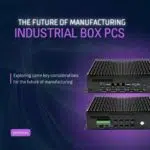A Panel PC is deemed suitable for an industrial environment when it possesses durability features such as rugged construction, high Ingress Protection (IP) rating against dust and water, a wide operating temperature range, industrial-grade components, and a robust touchscreen interface. Additionally, it should include design elements like fanless cooling systems, EMI/RFI shielding, customization options, long lifecycle support, and compliance with industry standards. These attributes collectively ensure that the Panel PC can withstand the challenging conditions of industrial settings and maintain reliable performance over an extended period.
Selecting the right Panel PC for industrial environments involves considering factors such as durability, performance, connectivity, and environmental conditions. Here are some key features to look for when choosing a Panel PC for industrial use:
Rugged Design:
Choose a Panel PC with a rugged and robust design that can withstand harsh industrial conditions, including exposure to dust, water, vibrations, and extreme temperatures. Look for devices with an IP65 or higher rating for dust and water resistance.
Industrial-Grade Components:
Ensure that the Panel PC is built with industrial-grade components to withstand the demands of continuous operation in challenging environments. This includes components such as industrial-grade motherboards, processors, and storage.
Wide Temperature Range:
Opt. for a Panel PC that can operate within a wide temperature range. This is crucial for industrial settings where temperatures can vary significantly, from freezing cold to high heat.
Touchscreen Technology:
Choose a Panel PC with a reliable and responsive touchscreen interface. Resistive or capacitive touchscreens are commonly used in industrial applications due to their durability and ease of use.
Sunlight Readability:
In outdoor or brightly lit environments, consider a Panel PC with enhanced display features for sunlight readability. This ensures that the display remains visible and readable even in challenging lighting conditions.
Customization Options:
Look for Panel PCs that offer customization options to meet specific industrial requirements. This may include options for different screen sizes, processing power, storage capacities, and additional I/O ports.
Fanless Cooling System:
Many industrial Panel PCs employ a fanless cooling system to minimize the risk of dust and debris entering the system. Fanless designs reduce maintenance requirements and enhance reliability, especially in environments with airborne particles
EMI/RFI Shielding:
Ensure that the Panel PC has proper electromagnetic interference (EMI) and radio-frequency interference (RFI) shielding. This is important in industrial environments where electronic noise can be prevalent.
Long Lifecycle Support:
Choose a Panel PC from a manufacturer that provides long lifecycle support. This ensures that replacement parts and support services will be available for an extended period, reducing the risk of obsolescence.
Connectivity Options:
Evaluate the connectivity options of the Panel PC. It should have a variety of ports, including USB, Ethernet, serial ports, and potentially wireless connectivity, to seamlessly integrate into existing industrial networks.
Remote Management Features:
Consider Panel PCs with remote monitoring and management capabilities. These features enable IT administrators to perform updates, troubleshoot issues, and monitor the health of the device without physically being present.
Compliance with Industry Standards:
Ensure that the Panel PC complies with relevant industry standards and certifications. This may include certifications for safety, electromagnetic compatibility, and environmental standards.
By carefully considering these features, you can select a Panel PC that meets the specific requirements of industrial environments and contributes to reliable and efficient operations. You can choose your trusted computing equipment from our wide range!





